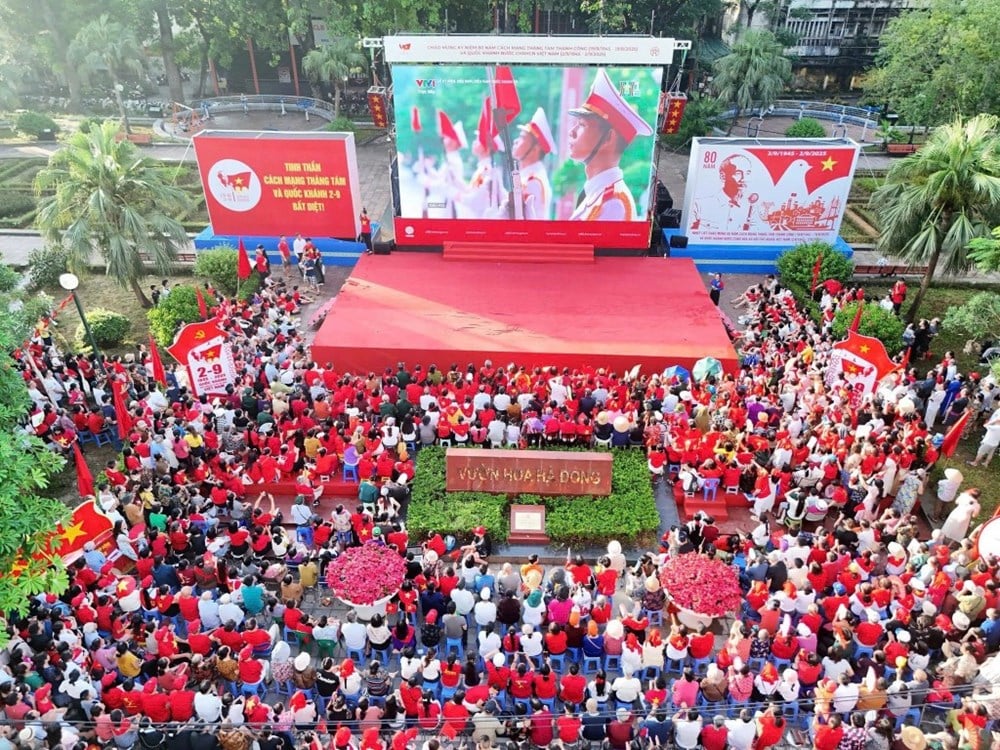
From the light of the Declaration of Independence to the journey of building a national, humane, and modern culture over the past 80 years, Vietnam has been continuing to write that autumn story with its own cultural soft power, the power that creates the identity, mettle, and future of a nation.
Radically change the way we look at people
If Vietnamese history has ever remembered the sacred autumns of heaven and earth, then the autumn of 1945 was the autumn of the human heart. It was not only the autumn of the desire for independence affirmed by action, but also the autumn that opened a great awakening: the awakening of national culture, the awakening of human dignity, the awakening of the mission of creating an autonomous future both materially and spiritually. The August Revolution succeeded not only because the Vietnamese people rose up to seize power, but also because they, for the first time, regained control of their own cultural destiny.
The August Revolution was a revolution that fundamentally changed the way people were viewed, no longer as subjects, no longer as objects of rule, but as creators of history, culture and development. A nation enslaved for thousands of years proved that they not only had the right to live, but also the right to learn, to know, to express their voice and soul through culture.
Therefore, when the Democratic Republic of Vietnam was born, one of the first actions that President Ho Chi Minh directed was not to mobilize the army or establish laws, but to eradicate illiteracy, open public education classes, popularize the national language, that is, to open up intelligence, nurture self-respect and sow the seeds of cultural light.
In the Declaration of Independence , He not only affirmed “the right to life, liberty and the pursuit of happiness”, which is not simply a political right, but also the first cultural declaration of the modern Vietnamese people. Because there is no true happiness if people still live in the darkness of ignorance, poverty, slavery and are denied cultural dignity. And from there, culture becomes an indispensable source in the journey to master the country, not a decoration, but the soul of a comprehensive revolution.
President Ho Chi Minh deeply understood that to build an independent country, we must start with building an independent, democratic, progressive and humane culture. In the first National Cultural Conference (1946), he wrote: "Culture must light the way for the nation to go."
That saying is not only a time indication, but also a consistent vision, placing culture in its proper place, both as the spiritual foundation of society and as the driving force behind the revolution. And from there, we see clearly: the August Revolution not only broke political prisons but also broke the invisible chains of old cultural prejudices, opening up a new space where all people have the right to participate in creating, enjoying and preserving national spiritual values.
A democratic culture begins with simple things: Farmers learn to sign, workers can watch movies, soldiers can listen to resistance poems, children in the mountains learn to read and write in bamboo classrooms. All of these create a revolutionary cultural flow, where culture is not contained in books, but lives among the people, for the people, and created by the people.
The autumn of 1945 was the autumn of independence, but also the autumn of new thinking about people, about the role of culture in national development. From that moment on, culture was no longer the shadow of power, but the light of the human heart, the means to liberate people both physically and mentally. That was the starting point for the modern cultural era of Vietnam, an era that we are still living in and continue to write about, with today's aspirations.
Forming and developing a culture for the people
Since the fall of 1945, a new era has truly begun not only for the political system, but also for modern Vietnamese culture, where the people are no longer the objects of propaganda, but the subjects of cultural creation. Over the past eighty years, Vietnamese culture has constantly changed, but throughout it there has been an unchanged axis of values: For the people, by the people and serving the happiness of the people.
Even in the midst of the two wars of resistance, culture did not stand aside, but was present as a special front, the front of the soul. The songs along the Truong Son road, the plays in the deep forest, the poems in the soldiers' wall newspaper, the adapted folk songs resounding through the loudspeakers, all created an unbroken flow, maintaining the national spirit in the most difficult years. Without "the sound of singing drowning out the sound of bombs", without the flame of faith in poetry, without the sound of national drums during the nights of discipline... then victory would certainly have been much more difficult.
Culture at that time was not the luxury of the city, but the luggage for the resistance war. The artist did not sit on the podium of fame but became a companion, comrade, soldier, fighting with the people on the front without gunfire. The poems of To Huu, the paintings of Le Lam, the music of Van Cao, Pham Tuyen... not only marked the era, but also inspired people to live, fight and sacrifice for noble ideals. It can be said that never before has Vietnamese culture been so imbued with the spirit of the people as in those years.
Entering the period of peace and construction, especially after the Renovation in 1986, Vietnamese culture entered a new chapter, the chapter of comprehensive development of the Vietnamese people. Cultural thinking was expanded not only to ethics, academics, and arts, but also to a system of living values, the foundation of sustainable development. The major Resolutions of the Party from the 5th Central Conference of the 8th term in 1998 to Resolution 33 in 2014, all clearly defined: Culture is not only the goal, but also the driving force of the renovation process.
Movements such as “All people unite to build a cultural life”, “Good people, good deeds”, “Studying and following Ho Chi Minh’s ideology, morality and style” have created a widespread culture, from the countryside, cities, to the border and islands. There, culture is no longer a declaration, but a way of life, a relationship between people, between people and the community, between people and nature, ancestors and the Fatherland. From village festivals to national festivals, from folk songs to international art festivals, from private classes to global universities, Vietnamese culture is gradually asserting its character and identity in the era of integration.
The achievements over the past 80 years are vivid evidence of a cultural era for the people: From the campaign for universal education to the universal education system and a widespread university network. From mobile cheo stages to grand theaters, international festivals, digital cinemas, online film distribution platforms. From traditional museums to digital heritage centers, virtual reality technology applications, digital cultural maps. From melodies and folk songs to Vietnamese music albums conquering Asian charts. From artisans from ancient villages to creative cultural startups of Vietnamese Gen Z on a global platform...
Culture today is no longer a “nice to have” thing, but has become a prerequisite for developing a sustainable, humane and happy society. More than ever, the explosion of the cultural industry, of digital creativity, of social media... is putting culture at the center of all development decisions. Culture is no longer passively standing behind, but is being shaped as a soft resource, a driving force for national brands, the foundation of political courage and social stability.
And that reality began with each small story about people, each simple cultural action, each decision imbued with the spirit of the people. Vietnamese culture, eighty years after that autumn, has been constantly moving, but has never strayed from the core values that the August Revolution left behind: For independence, for freedom, and for the happiness of every citizen in this beautiful country.
Source: https://baovanhoa.vn/van-hoa/van-hoa-vi-doc-lap-tu-do-va-hanh-phuc-165942.html



![[Photo] Experience at the Exhibition of 80 years of national achievements - Meaningful activity for new students](https://vphoto.vietnam.vn/thumb/1200x675/vietnam/resource/IMAGE/2025/9/10/286061b79abb4afa8961d730c9833cdd)



![[Photo] Close-up of 3,790 resettlement apartments in Thu Thiem to continue auction](https://vphoto.vietnam.vn/thumb/1200x675/vietnam/resource/IMAGE/2025/9/10/be974e2058f74c9c8dc1f400124f3653)

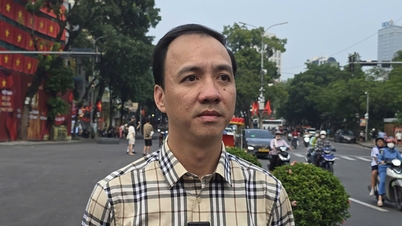

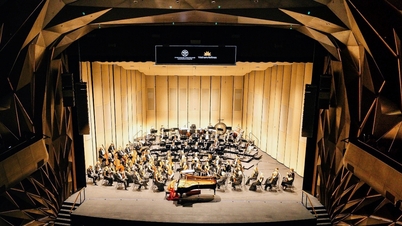











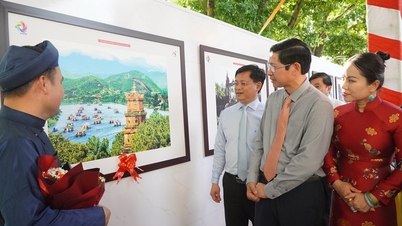


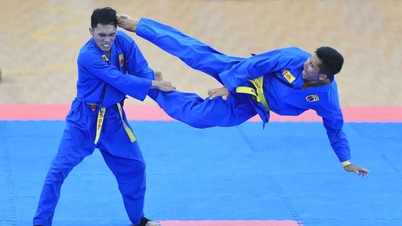
























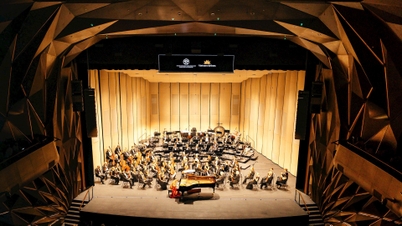



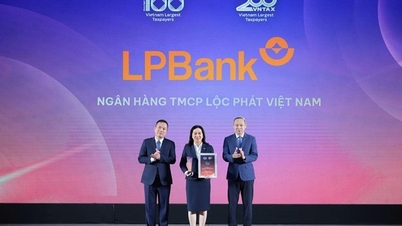
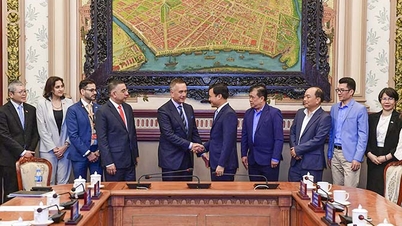














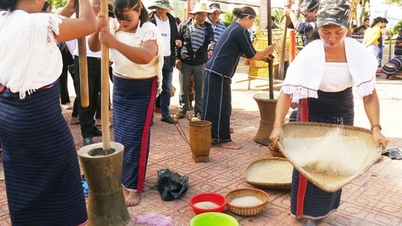









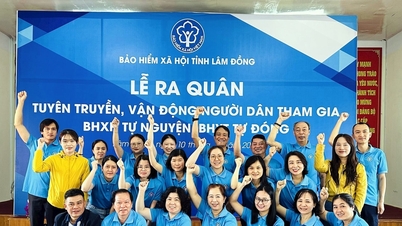

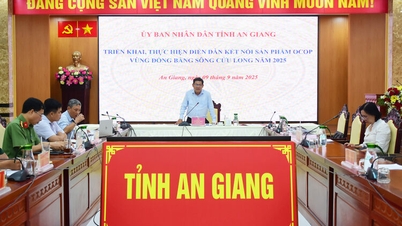










Comment (0)